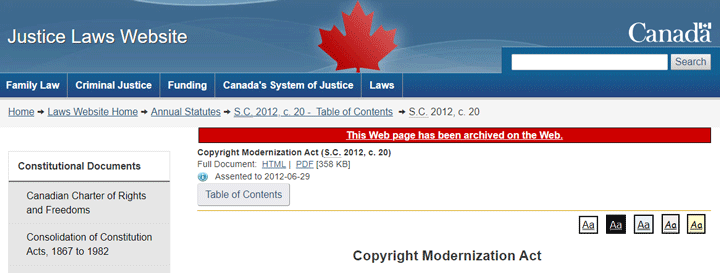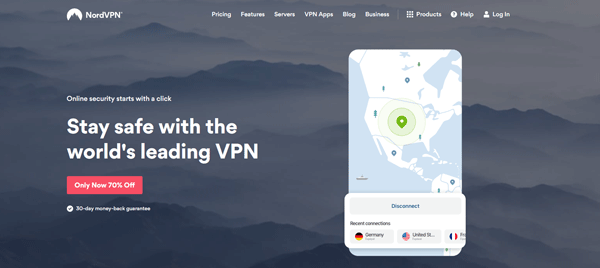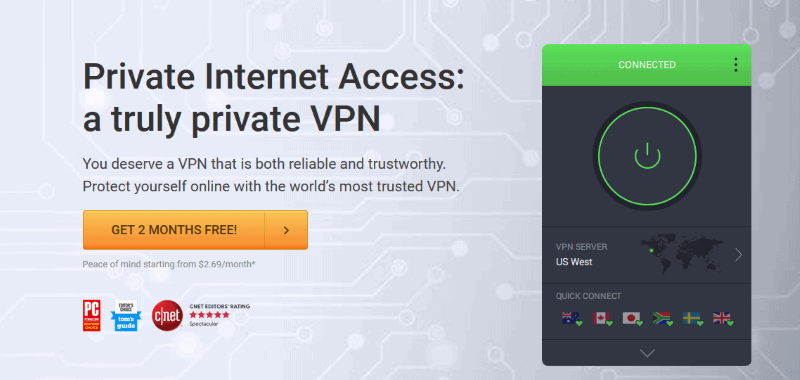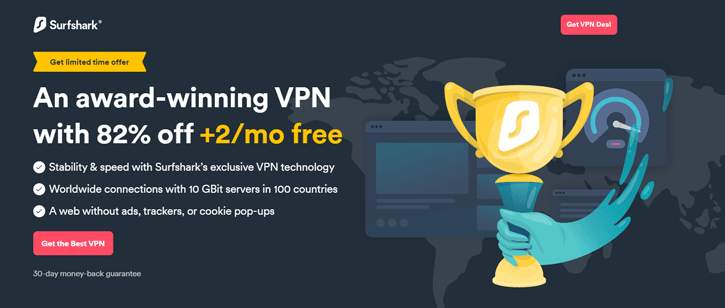Do you want to learn how to download torrents safely in Canada? Are you confused about the legality of torrenting in Canada, or the risks involved?
I’m here to explain and simplify the risks (and potential solutions) in non-technical terms so you can get back to downloading your favorite content.
Canadian copyright law (and enforcement) is always changing, but we’ll continue to update this article to reflect the most recent and accurate information.
Disclaimer: I’m not a lawyer, nor do I claim to be. Several sections in this article represent my understanding of Canada’s laws as they relate to copyright and torrents. This is not legal advice and I/we do not condone the torrenting of copy-protected materials.
What you’ll learn:
- Is Torrenting illegal in Canada?
- How are torrents & copyright violations monitored?
- Risks & Consequences
- How to protect yourself while torrenting
- Best VPNs for Torrenting in Canada
Is Torrenting Legal in Canada?
The short answer is yes, torrenting is legal everywhere in Canada, but that’s not the whole story. BitTorrent is just a file-sharing technology. The legality of your torrent usage depends on the content you’re sharing.
The sharing (uploading) of copyrighted content is illegal in Canada and could result in fines, lawsuits, or theoretically even criminal penalties in some circumstances.
There’s also a distinction between downloading (leaching) torrents and uploading (seeding) them. Under Canadian law, it’s the actual distribution of copyrighted content that is most likely to result in some sort of warning or penalty.
Which Laws should I be aware of?

Most copyright enforcement in Canada stems from the Copyright Modernization Act which was passed in 2012 and has been the basis for subsequent torrent-related policies.
While it does set up a framework for policing copyright infringement, it does not make torrenting illegal in Canada.
The CMA has several key provisions that relate to Bittorrent piracy:
- Expanded digital rights – timeshifting, format-shifting and content backup is a legal right as long as you’re not bypassing digital locks (DRM).
- Limited Damages – The statutory damages for non-commercial infringement (not for profit) is limited to $100-$5,000 per infringed work. According to our research, most judgements have been towards the low end of that range.
- Notice and Notice Regime – ISPs are required to forward notices of alleged infringement and to notify users (that’s you) of a violation.
- Periodic Review – Copyright law must be reviewed every five years to ensure they’re still relevant and effective.
Learn More: a Practical guide to Notice & notice
Distributing vs. Downloading
In Canada there is a legal distinction between downloaders and distributors of copyrighted content. This is especially import for bittorrent users because under the protocol’s design, all peers (that’s you) are also seeding the network simultaneously.
Because of this you should make sure you know whether you’re downloading files that are copyrighted.
This is why some internet service providers (ISPs) in Canada have decided to block upstream bittorrent bandwidth altogether.
There is no way to entirely block upstream bandwidth within most bittorrent client software, so many torrenters use other methods to anonymize their activity — typically the use of non-logging VPNs.
How are Torrents Monitored in Canada?
You may assume that your ISP is monitoring your torrent traffic and reporting you to the authorities, but this is hardly ever the case.
Instead, torrent enforcement nearly always involves the direct monitoring of individual torrent swarms for specific copyrighted torrent files. Typically a rightsholder would outsource this work to a monitoring agency, law firm, or SaaS tool.
Because your IP address is public when torrenting, these tools simply scrape the list of peers sharing a file. These IP addresses will then be geo-located to their respective countries and rightsholders will choose what enforcement actions (if any) to take in each region.
In Canada, this most often takes the form of a copyright notice where your ISP forwards a warning with the name of the allegedly infringed file as well as the date/time it took place.
Some notices may be accompanied by settlement demands by a rightsholder or their agent. It’s important to note that because the notices are forwarded the sender doesn’t actually know your name unless they successfully sue to identify you.
Risks and Consequences of Torrenting in Canada
There are several risks involved with torrenting in Canada. This section primarily focuses on legal (and financial) risks associated with the torrenting copyrighted works that you don’t own the rights too.
ISP blocking / bans
If your account frequently receives forwarded copyright infringement notices, your ISP may elect to block torrent traffic, or in extreme cases possibly cancel your account altogether. ISPs in Canada now also have the right to block individual websites if they choose (such as a torrent tracker).
Fines
The Copyright Modernization Act provides for statutory fines for willful infringement. You could be fined $100-$5000 per violation of Canada’s copyright laws.
Lawsuits
The torrent-troll business model was massively successful (for a while) in the United States and has made its way to Canada as well. Typically the first contact is a forwarded ‘demand letter’ as part of the Notice & Notice regime.
Often this is the only contact and an easy way for torrent trolls to extract 3 and 4-figure settlements from alleged infringers without any actual legal action or court costs.
In rare cases, rightsholders may actually sue and attempt to unmask the owners of infringing IP addresses. This is most common for pornographic content, perhaps because people are more likely to settle rather than risk the embarrassment of public exposure.
Some movie studios are also getting in on the act, though it’s typically smaller production companies rather than major studios.
How to protect yourself when torrenting
There are some easy, common-sense steps you can take to dramatically enhance your privacy when torrenting. You’ll find that nearly all long-time torrenters use at least one of these security techniques.
1. Use a VPN
This is the easiest way to improve your privacy when torrenting. A VPN provides 3 key benefits for BitTorrent users.
- Anonymize your IP – Nearly all torrents are monitored based on your public IP address. When using a VPN, torrent peers see the VPN’s IP address, not your real IP.
- Encrypt your Traffic – By encrypting your internet traffic, you can bypass firewalls and even prevent your ISP from knowing you’re torrenting at all.
- Geo-locate your connection – You can use an IP address from a country other than Canada where torrent laws are less strict. Like these top countries for torrenting.
2. Try a Private Tracker
If you download large public torrent swarms (using public trackers) your IP is much more likely to be swept up in a torrent database.
Private trackers, by contrast, are niche private communities where only vetted users can join.
They come with myriad benefits including:
- Curated, hard-to-find content that is usually virus and malware-free
- Super-fast download speeds
Of course there are some caveats. You first need to secure an invite which can be very challenging for the best trackers. You’ll also need to maintain strict share ratios, quotas, and a code of conduct.
3. Don’t forget the AntiVirus
Even in the best communities, downloading files from strangers can be risky. Executable files are by far the most dangerous, especially because most users stay logged into an admin account on their OS, meaning malware doesn’t even need elevated privileges to be installed.
In fact, infected torrents have been a common distribution method for some of the most dangerous malware including:
- Stalkerware
- Keyloggers
- Crypto miners
- Remote Access Trojans (RATs)
- and Ransomware
So be smart. Use a high-quality antivirus with real-time protection, which should hopefully reduce the risk of any of the above garbage making it’s way onto your system.
It’s also a good idea to avoid software and installable files altogether. Media like movies and music (though not riskless) are much less likely to be malicious.
Best VPNs for Torrenting in Canada
As an avid torrenter for more than a decade, trust me when I say that a quality Virtual Private Network (VPN) is a torrenters best friend.
It is a must-have tool that provides security, enhanced privacy and peace of mind when downloading from torrent sites and trackers.
Nowadays there are literally hundreds of VPN providers to choose from, but we only recommend a handful for bittorrent users. These VPN services have proven their commitment to privacy (and torrent-friendliness) over a long period of time.
You can’t go wrong with any of them, but I’ve ranked them according to their value for the money.
1. NordVPN (best all-around)

NordVPN is one of my favorite all-around VPNs. Its capabilities go far beyond the average VPN, especially when it comes to streaming and downloading torrents.
NordVPN is a true zero-log VPN and they’ve submitted to an independent 3rd-party audit to verify their public logging claims. Unlike some competitors, NordVPN has never been involved in a public logging scandal or had their logging policy seriously called into question.
Their VPN server network is large with 10,000+ IP addresses and 60+ countries at your disposal. NordVPN offers specific p2p-optimized servers for faster torrent downloads and better peer availability.
You’ll also be well-protected with their 256-bit Encryption, kill-switch, DNS leak protection, and optional VPN-over-Tor servers. They’re happy to have torrent users on their network and explicitly allow torrent traffic.
2. Private Internet Access

Private Internet Access (PIA) is the OG of VPNs. They practically invented the zero-log VPN category, and I’ve been a paying customer for more than 12 years.
PIA was acquired by Kape Technologies a while back (owner of ExpressVPN and Cyberghost), and the transition has mostly been an upgrade for PIA. Their software is dramatically better than the barebones VPN client when I first subscribed.
PIA’s speeds are decent and their no-logs policy has also been independently audited.
Years later, PIA is still the #1 VPN used by visitors of this website and one of the best values in the entire industry with prices starting under $3.33/month.
3. Surfshark VPN

Surfshark is the sibling brand of NordVPN (both owned by Nord Security) and is one of the most affordably priced VPNs in the industry.
In terms of features and torrent-friendliness, Surfshark is very comparable to NordVPN. It also excels at streaming and unblocking geo-restricted content.
Surfshark has all the essentials you’d want, including:
- an audited no-logs policy
- Unlimited bandwidth
- Torrenting specifically allowed
- built-in kill-switch
- good speeds
In fact the only thing missing (compared to NordVPN) is SOCKS5 proxy servers, which 90% of you don’t use anyway.
Best of all, Surfshark is priced lower than most of the competition, with long-term subscriptions starting as low as $2.49/month.
Why Use a VPN?
A VPN is the easiest way to upgrade your digital privacy for all use cases, but especially torrenting, file-sharing, and streaming.
Not only will your VPN hide your real IP address from torrent peers, monitoring tools and swarm scrapers, it’ll also provide end-to-end encryption that prevents your ISP from monitoring your browsing and download history.
Even better, all of our recommended VPNs have a vast server network that lets you access thousands of IP addresses in countries around the world. This is great not just for reducing the legal risk of torrenting, but also for accessing geo-blocked content from the global catalog of popular streaming services (e.g. Netflix).
In my opinion, a VPN is most effective way to keep your torrent downloads and torrent history private and avoid the attention of your internet provider. A VPN will work with ISP and any torrent client (including mobile).
More ways to stay safe
Here are some additional tips and strategy to safely download torrent files in Canada.
- Stick to legal torrents – This one is obvious, but you can virtually eliminate legal risks if you stick to public domain and CC0-licensed torrents. Avoid copyrighted material and you’ll avoid trouble. Check out LegitTorrents for sources.
- Read the comments – Public trackers usually have a comment section for each file. Check for any negative feedback, especially regarding fake or malicious files
- Consider Kodi – Kodi has fewer risks (even for the same content) because the distribution model is server – > peer for most kodi addons. If you’re mostly torrenting movies and shows, Kodi might be the way to go. Learn the differences.